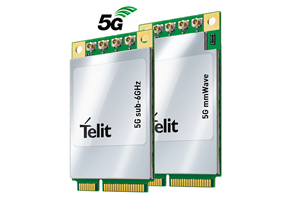Wireless broadband networking transformed with ‘blazing fast’ 5G wireless speeds

Telit claims it will be among the first providers of data cards based on Qualcomm Technologies’ second generation 5G New Radio (NR) modem, the Snapdragon X55 5G modem and their antenna modules with integrated RF transceiver, RF Front-End (RFFE) and antenna elements, representing an important milestone in the Telit roadmap.
The new data cards are said to be ideal for enterprise network appliances, branch and remote office routers, fixed wireless broadband internet access and other bandwidth-intensive applications benefiting from speeds more than 10 times what a median LTE device can deliver.
“Qualcomm Technologies is leading the way in the transition to the 5G era and we’re excited to collaborate with industry leaders such as Telit to enable 5G commercialisation in 2019 and beyond,” said Gautam Sheoran, senior director, product management, Qualcomm Technologies, Inc. “The Snapdragon X55 5G modem and RFFE solutions, which are integrated in Telit’s data cards, are innovatively designed to bring 5G to broad range devices and will help expand 5G connectivity well beyond smartphones.”
The first use cases for 5G ultra-high speeds will focus on transforming fixed wireless access and on enabling enterprises to grow and reconfigure their networks for improved resilience and speed,” said Manish Watwani, chief product and marketing officer, Telit.
“This enables pioneering and unprecedented growth in business models leveraging the ability to create and establish new operating sites, offices and branches in an instant to take advantage of non-forecasted business opportunities that were previously inaccessible among other benefits.”
The new 5G data cards are ideal for fixed wireless access applications such as enterprise routers and gateways, and customer premise equipment (CPE). Also, applications such as video cameras, starting today with 4K/HD and evolving to the coming generation 8K video, will also benefit of the high bandwidth provided by 5G, thanks to the aggregated bandwidth of up to 800Mhz supported in the mmWave spectrum; capable of delivering multi-gigabit speeds.
At least two new data cards variants will be available. The first will support 5G and LTE in bands below 6 GHz in time division duplex (TDD) and frequency division duplex (FDD) mode. The second will also support 5G in mmWave bands, initially available in the United States in sync with carrier rollout plans.
The new data cards will include non-standalone (NSA) and standalone (SA) modes of operation to enable support for all major 5G networks expected to be deployed.
They will also deliver a seamless 5G evolution path for current Gigabit class of LTE devices based on the pioneering LM940 LTE category 11 and LM960 LTE category 18 data cards successfully deployed in a wide variety of industrial, commercial and public safety applications.
Comment on this article below or via Twitter @IoTGN
